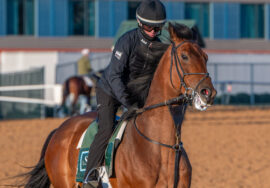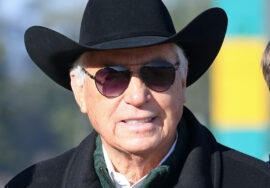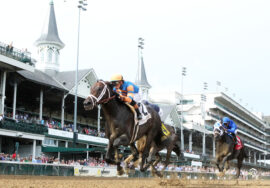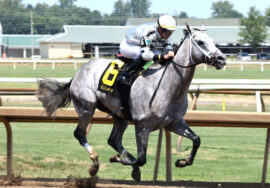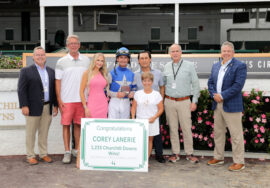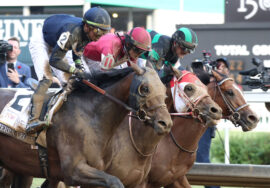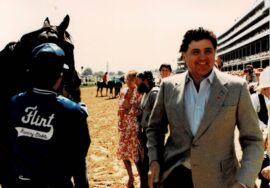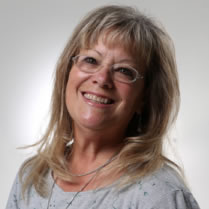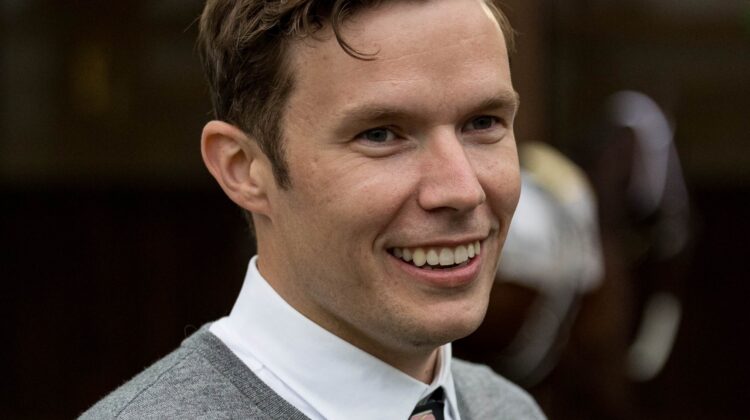
Q&A: Ellis Park racing secretary Baley Hare
Baley Hare started as the kid in the racing offices at tracks across Kentucky. But 11 years later, the 31-year-old brings a deep racing pedigree and extensive experience into his new post as Ellis Park’s racing secretary.
Hare replaces Dan Bork, bound for Colonial Downs after spending 19 years at Ellis Park. Said Bork (who remains as Churchill Downs’ assistant racing secretary in his year-round CDI position: “I wouldn’t leave this position in anyone else’s hands besides Baley. Over the past several years, we’ve worked hand in hand managing entries and coordinating the day-to-day racing operation. With Ellis Park and Colonial Downs both operating as top-tier summer circuits, I know we’ll continue to support each other and the broader goals of our racing program.”
Hare spoke with Jennie Rees between races at Churchill Downs for this newsletter’s Q&A, which has been lightly edited for clarity and context.
Where have you been an assistant racing secretary?
“I’ve been assistant under Ben (Huffman), Dan (Bork) and Tyler (Picklesimer) at Ellis Park previously, Keeneland currently and Kentucky Downs currently. I’ve done stakes work at Kentucky Downs, Keeneland, Fair Grounds just to start it off.”
Your dad, Scott, is a jockey agent. Did you grow up wanting to be a racing secretary?
“I’ve done a little bit of everything in a small way. I’m a third-generation racetracker on both sides. Dad rode before he was an agent. Grandpa rode. … He was riding the Omaha-Phoenix circuit. Dad started riding in Omaha, then he transitioned to a Canterbury-Phoenix type of guy… Mom (Darcy Hare) trained. Her brothers and sisters and Grandpa trained, as well as having a small farm out in Washington where they’d breed some horses…. Grandpa had a big stake over at Longacres before they had Emerald. He dabbled a little bit on the West Coast. Aunts and uncles had a big standing in Arizona and previously a little stint in California.
“I can’t tell you I have the most horsemanship of any of our local guys here, but I can at least put myself in their shoes. I know where they’re coming from.”
How did you end up in Kentucky?
“I grew up in Texas, got my first racing gig at Retama. Not the biggest place to be, but I was home. Being around and seeing people and as many places as we’d been and as small a world as it is — Dad having a good career as an agent and able to open doors — we know a lot of people. When you know one, you go to the next and (soon) you know all. After my first quarter-horse and thoroughbred meet in Texas, I got an opportunity to be the low man on the totem pole in an opening at the Fair Grounds just to get my foot in the door. Kind of waited around. At the time, Dad had a rider who was going to Kentucky. I went up here looking, open to anything. Luckily I was able to find a spot with Dan at Ellis. That was 2014, maybe?”
And of course you ingratiated yourself by being willing to ride the ostriches and camels in those races at Ellis Park when there weren’t enough jockeys wanting to ride.
“Right.”
Aren’t you a two-time champion or something?
“Yeah, I got a few mounts there and at other places, surprisingly. No, that was fun, and I’m glad I did it.”
Did you ever want to be a jockey?
“Jock was an explicit no-no. Just because growing up that way. I outgrew it very quickly anyway. I never had experience on the track galloping, but I was doing a lot of barn work on the ground. Summers at the family farm in junior high and high school away from the track. I did one stint with a trainer at Prairie Meadows, where I was grooming in the mornings and selling programs and miscellaneous front-office work during racing. At home I also sold programs and ran the valet lot, took $2 for parking.”
For years, you seemed to be called “the kid” in the racing office. But it seems the statute of limitations for that has run out.
“When I came in here, it was a very solid crew of individuals who have kind of spread out into their own little worlds, whether it’s Tia (Murphy) or Sue (Brewster) or Tiffany (Bourque). Everybody is still involved, but they’re just in separate areas now. To see people like them work, and how they worked, and to have the new era versus the old era when I first started, and how everybody comes together, there was a lot of learning by absorption. Learning by getting your feet wet, jumping in there, seeing how they did it, because they did it the correct way. As a kid — kids are always tech-y, kids are on the new stuff — being able to see the old way and me and my new ways and kind of how my first thoughts on how things might be done versus the real way it should be — keeping the old ways and kind of making them new again.”
So the old ways, but take advantage of technology?
“Yes. There are absolutely things like that. There’s always a pickup here and there regarding online stuff, computers. It’s funny to hear people’s opinions on turn-arounds and how far out we enter. They were doing things 48 hours (entries before races) and whipping out a program. It’s funny to hear the interaction of ‘Oh, we can’t do that!’ ‘Well, we used to.’”
Now there’s the computer program that tells you if a horse isn’t eligible for a race (versus having to manually check it).
“There’s a lot of stuff like that now that definitely helps in the office to get the answer quicker and keeps everybody on the same page. They are fleshing those things out, new ideas every day between The Jockey Club and Equibase. That’s what I’m seeing. There’s a flowering of a new age. Granted, horsemen are horsemen for a reason. Horsemen have senses, they know what they’re looking at. They know what the animal needs. There are all these different things. A lot of times that doesn’t line up with IT, technological prowess. As far as the new stuff is concerned, being able to place yourself in (horsemen’s) shoes, is a plus.”
Did you ever think about going to college?
“I was really supposed to. I did pretty well in school. Long story short, I tried the real world for a year or so, then I got pulled back into the right direction of racing. Once I started my way in the racing office, the dominoes started falling for me, luckily. I had to wait for a few spots, there were a few years, a few breaks, but when you’re young, you can absorb those and wait and see what comes up next to get over the next hurdle.”
What about the opportunity of being the racing secretary at Ellis?
“If I’d have told anybody in the Kentucky circuit three or five years ago, close your eyes and imagine Ellis Park without Dan Bork or Tia Murphy (now Turfway Park’s year-round horsemen’s bookkeeper), they’d have called you a bold-faced liar. It’s wild that it happened, and I absolutely will miss both of them. And they will be missed by everybody else. But we’ll try to keep everything going the best way possible. We’re happy for Tia. Dan’s going over to Colonial to get things jump-started over there.
“It’s weird for me to take the ball and run with it. I’m just here to keep it going and keep the horsemen happy.”
One thing that will keep horsemen happy is the $100,000 maiden races for Kentucky-breds this summer.
“We’re excited about that. Ellis is known for the baby races, and we’re going to continue that. Just trying to keep everything on the up and up, instead of going in a different direction.”
Now you just have to keep the horsemen happy getting races to fill. “Can’t you put that up as an ‘extra’ for me?”
“There’s always that. And nobody is wrong. It’s just keeping everything as a whole going in the right direction.”
So has this been your goal, to be a racing secretary at some point, somewhere? Or did you not have time to think about it; you just did the job in front of you?
“I never had that distinct target laid out on the desk. Now that we’re here, I’ll accept it and try to do what we can with it.”
Anything new that horsemen will notice?
“I learned a lot under Dan. The door is always open. There’s no reason not to ask him a question. I’d rather ask than have something horrible happen and say, ‘Oh, I should have done this.’ … Nothing world-changing by any means. We’ll use the turf course, we’ll run our maidens, we’ll try to keep our allowance horses around. We’ll try to keep the stakes horses around. Maybe they won’t have to ship to New York or wherever else is having a big day, trying to keep them home, and maybe the horse can sleep in its bed every night.”




